八年级下册期中英语试题
- 格式:doc
- 大小:132.52 KB
- 文档页数:9
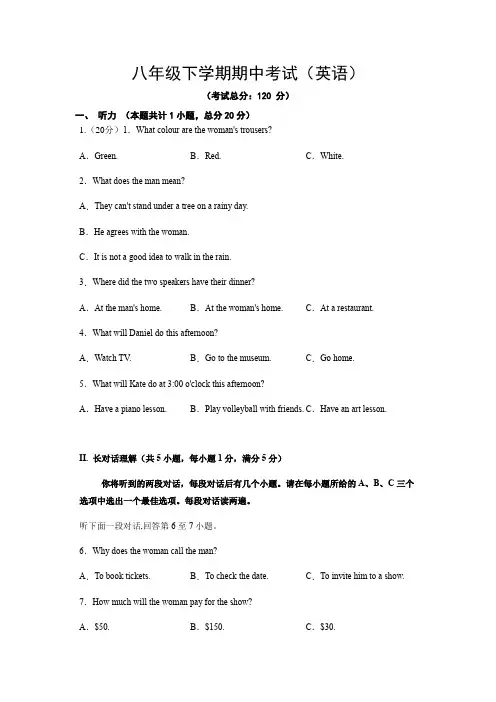
八年级下学期期中考试(英语)(考试总分:120 分)一、听力(本题共计1小题,总分20分)1.(20分)1.What colour are the woman's trousers?A.Green.B.Red.C.White.2.What does the man mean?A.They can't stand under a tree on a rainy day.B.He agrees with the woman.C.It is not a good idea to walk in the rain.3.Where did the two speakers have their dinner?A.At the man's home.B.At the woman's home.C.At a restaurant. 4.What will Daniel do this afternoon?A.Watch TV.B.Go to the museum.C.Go home.5.What will Kate do at 3:00 o'clock this afternoon?A.Have a piano lesson.B.Play volleyball with friends.C.Have an art lesson.II. 长对话理解(共5小题,每小题1分,满分5分)你将听到的两段对话,每段对话后有几个小题。
请在每小题所给的A、B、C三个选项中选出一个最佳选项。
每段对话读两遍。
听下面一段对话,回答第6至7小题。
6.Why does the woman call the man?A.To book tickets.B.To check the date.C.To invite him to a show.7.How much will the woman pay for the show?A.$50.B.$150.C.$30.听下面一段对话,回答第8至10小题。

第二学期期中考试八年级英语试题(考试时间为100分钟,试卷满分120分。
考试形式闭卷。
)听力部分共20小题,每小题1分,计20分第一部分:听对话回答问题。
本部分共有10道小题,每小题你将听到一段对话,每段对话读两遍。
在听每段对话前,你将有5秒钟的时间阅读题目;听完后,你将有5秒钟的时间选择你认为最合适的备选答案。
1. Where would Andy like to visit for his holiday?2. What does Ben do after school now?A. B. C.A. B.3. Where does this dialogue probably take place?A. B.4. What does Simon usually use his computer for?A. B.5. What will the gover nment build here?A. A new school.B. A new cin ema.6. How does the man ofte n con tact his friends abroad?A. By e-mail.B. By Wechat.7. When will the bus come?A. At 9:50.B. At 10:00.8. What will they invite Susan and Peter to do?A. Go on a camp ing trip.B. Go for a pic nic.9. How long will Father stay in the USA?B. For about fiftee ndays. C. A new park. C. Through letters.C. At 10:10.C. See a film.A. For a week. C. For a month.C.10. Why doesn ' t the woman know where the City Bank is? 21*cnjy*comA. She is a tourist.B. She has only just moved to the city.C. The bank recen tly moved.第二部分:听对话和独白回答问题。
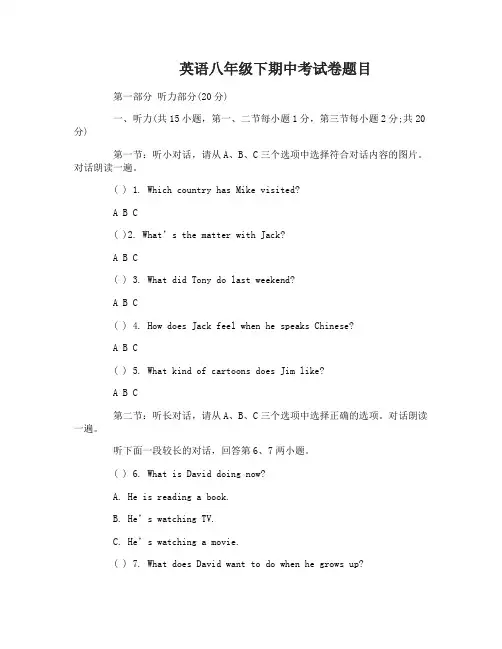
英语八年级下期中考试卷题目第一部分听力部分(20分)一、听力(共15小题,第一、二节每小题1分,第三节每小题2分;共20分)第一节:听小对话,请从A、B、C三个选项中选择符合对话内容的图片。
对话朗读一遍。
( ) 1. Which country has Mike visited?A B C( )2. What’s the matter with Jack?A B C( ) 3. What did Tony do last weekend?A B C( ) 4. How does Jack feel when he speaks Chinese?A B C( ) 5. What kind of cartoons does Jim like?A B C第二节:听长对话,请从A、B、C三个选项中选择正确的选项。
对话朗读一遍。
听下面一段较长的对话,回答第6、7两小题。
( ) 6. What is David doing now?A. He is reading a book.B. He’s watchin g TV.C. He’s watching a movie.( ) 7. What does David want to do when he grows up?A. To be an astronaut.B. To write books about space travel.C. To help build a spaceship听下面一段较长的对话,回答8-10三个小题。
( ) 8. Where do they go in the movie?A. To the sunB. To MarsC. To the moon( ) 9. Where does the story happen in the movie?A. In EnglandB. In AmericaC. In Australia( ) 10. How many people went into space in the movie?A. ThreeB. FourC. Five第三节:听下面一段对话,请根据提问从A、B、C三个选项中选择正确的选项,完成信息记录表。
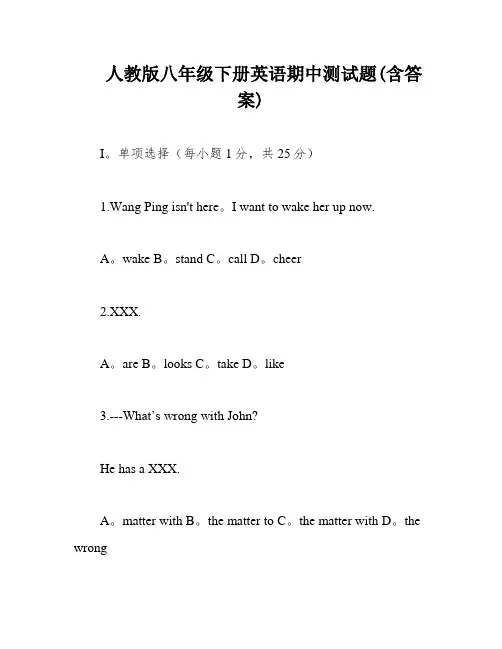
人教版八年级下册英语期中测试题(含答案)I。
单项选择(每小题1分,共25分)1.Wang Ping isn't here。
I want to wake her up now.A。
wake B。
stand C。
call D。
cheer2.XXX.A。
are B。
looks C。
take D。
like3.---What’s wrong with John?He has a XXX.A。
matter with B。
the matter to C。
the matter with D。
the wrong4.They have to put off the sports meeting because of the bad weather.A。
on B。
out C。
off D。
into5.XXX.A。
XXX giving up6.--- May I borrow the book?Yes。
You can keep it for two weeks.A。
borrow。
XXX。
keep D。
lend。
keep7.The man offered the job to me last year.A。
XXX8.XXX as he went to bed.A。
went B。
fell C。
falls D。
will fall9.--- Could you please give me a ride downtown?Sure.A。
gave。
Sorry B。
gets。
Sorry C。
give。
Sure D。
get。
Sure10.Why not tell him the good news?11.Smoking is bad for your health。
You should give it up.12.---It’s too cold。
Would you mind not opening the window?Certainly not。
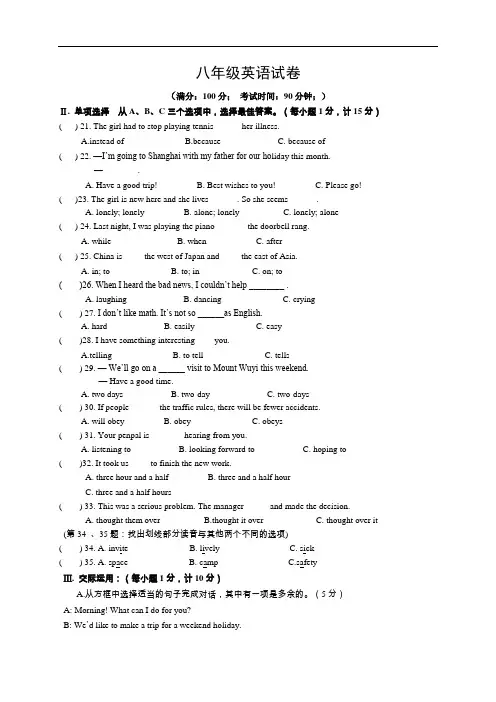
八年级英语试卷(满分:100分;考试时间:90分钟;)Ⅱ. 单项选择从A、B、C三个选项中,选择最佳答案。
(每小题1分,计15分)( ) 21. The girl had to stop playing tennis ______her illness.A.instead ofB.becauseC. because of( ) 22. —I’m going to Shanghai with my father for our ho liday this month.—________.A. Have a good trip!B. Best wishes to you!C. Please go! ( )23. The girl is new here and she lives ______. So she seems ______.A. lonely; lonelyB. alone; lonelyC. lonely; alone( ) 24. Last night, I was playing the piano_______ the doorbell rang.A. whileB. whenC. after( ) 25. China is ____ the west of Japan and ____ the east of Asia.A. in; toB. to; inC. on; to( )26. When I heard the bad news, I couldn’t help ________ .A. laughingB. dancingC. crying( ) 27. I don’t like math. It’s not so ______as English.A. hardB. easilyC. easy( )28. I have something interesting ____you.A.tellingB. to tellC. tells( ) 29. —We’ll go on a ______ visit to Mount Wuyi this weekend.— Have a good time.A. two daysB. two-dayC. two-days( ) 30. If people ______ the traffic rules, there will be fewer accidents.A. will obeyB. obeyC. obeys( ) 31. Your penpal is _______ hearing from you.A. listening toB. looking forward toC. hoping to( )32. It took us ____ to finish the new work.A. three hour and a halfB. three and a half hourC. three and a half hours( ) 33. This was a serious problem. The manager _____ and made the decision.A. thought them overB.thought it overC. thought over it (第34 、35题:找出划线部分读音与其他两个不同的选项)( ) 34. A. invite B. lively C. sick( ) 35. A. space B. camp C.safetyⅢ. 交际运用:(每小题1分,计10分)A.从方框中选择适当的句子完成对话,其中有一项是多余的。
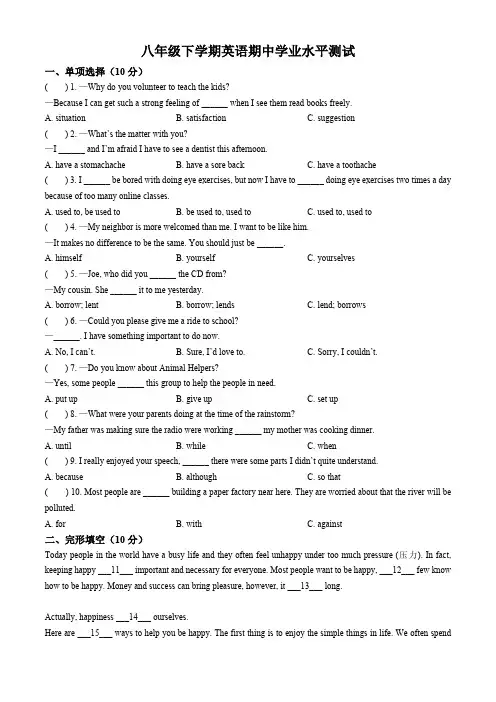
八年级下学期英语期中学业水平测试一、单项选择(10分)( ) 1. —Why do you volunteer to teach the kids?—Because I can get such a strong feeling of ______ when I see them read books freely.A. situationB. satisfactionC. suggestion( ) 2. —What’s the matter with you?—I ______ and I’m afraid I have to see a dentist this afternoon.A. have a stomachacheB. have a sore backC. have a toothache( ) 3. I ______ be bored with doing eye exercises, but now I have to ______ doing eye exercises two times a day because of too many online classes.A. used to, be used toB. be used to, used toC. used to, used to( ) 4. —My neighbor is more welcomed than me. I want to be like him.—It makes no difference to be the same. You should just be ______.A. himselfB. yourselfC. yourselves( ) 5. —Joe, who did you ______ the CD from?—My cousin. She ______ it to me yesterday.A. borrow; lentB. borrow; lendsC. lend; borrows( ) 6. —Could you please give me a ride to school?—______. I have something important to do now.A. No, I can’t.B. Sure, I’d love to.C. Sorry, I couldn’t.( ) 7. —Do you know about Animal Helpers?—Yes, some people ______ this group to help the people in need.A. put upB. give upC. set up( ) 8. —What were your parents doing at the time of the rainstorm?—My father was making sure the radio were working ______ my mother was cooking dinner.A. untilB. whileC. when( ) 9. I really enjoyed your speech, ______ there were some parts I didn’t quite understand.A. becauseB. althoughC. so that( ) 10. Most people are ______ building a paper factory near here. They are worried about that the river will be polluted.A. forB. withC. against二、完形填空(10分)Today people in the world have a busy life and they often feel unhappy under too much pressure (压力). In fact, keeping happy ___11___ important and necessary for everyone. Most people want to be happy, ___12___ few know how to be happy. Money and success can bring pleasure, however, it ___13___ long.Actually, happiness ___14___ ourselves.Here are ___15___ ways to help you be happy. The first thing is to enjoy the simple things in life. We often spend___16___ time thinking about the future — for example, going to a famous university or getting a good job after graduation (毕业). You should enjoy simple pleasure in life, such as reading a good book, listening to your favorite music or spending time ___17___ good friends and so on.The second secret is to be ___18___. Many people enjoy dancing or playing sports. You can forget all your problems and only pay attention to the activity you are doing.The third secret, helping others is a good way to keep happy. You always feel happy when you do ___19___ for someone. You can do ___20___ for your parents, help a friend or a classmate with his or her hobby, or go shopping to buy food for an old neighbor.In a word, learning to be happy is good for your health.根据短文内容选择最佳答案。
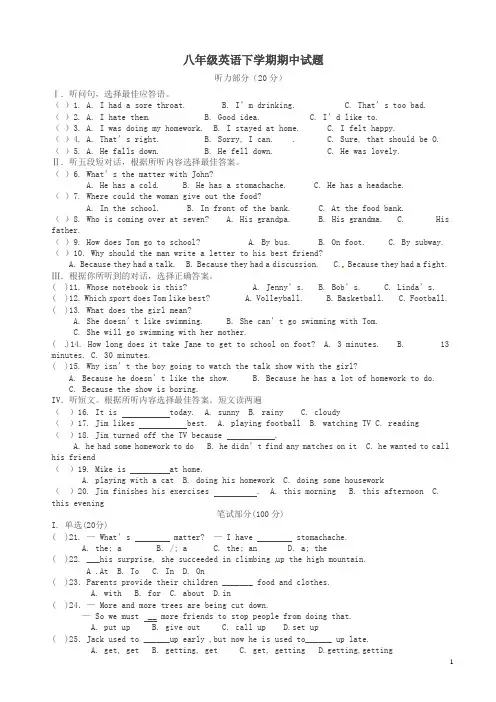
八年级英语下学期期中试题听力部分(20分)Ⅰ.听问句,选择最佳应答语。
()1. A. I had a sore throat. B. I’m drinking. C. That’s too bad.()2. A. I hate them. B. Good idea. C. I’d like to.()3. A. I was doing my homework. B. I stayed at home. C. I felt happy.()4. A. Tha t’s right. B. Sorry, I can. . C. Sure, that should be O. ()5. A. He falls down. B. He fell down. C. He was lovely.Ⅱ.听五段短对话,根据所听内容选择最佳答案。
()6. What’s the matter with John?A. He has a cold.B. He has a stomachache.C. He has a headache.()7. Where could the woman give out the food?A. In the school.B. In front of the bank.C. At the food bank.()8. Who is coming over at seven? A. His grandpa. B. His grandma. C. His father.()9. How does Tom go to school? A. By bus. B. On foot. C. By subway. ()10. Why should the man write a letter to his best friend?A. Because they had a talk.B. Because they had a discussion.C. Because they had a fight. Ⅲ.根据你所听到的对话,选择正确答案。
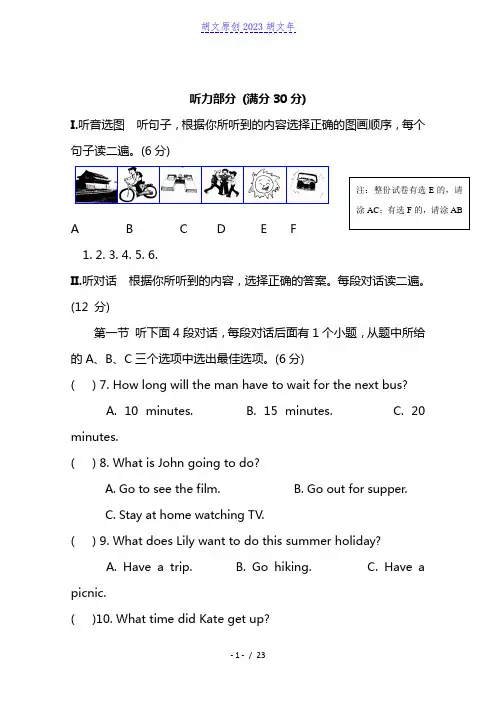
听力部分(满分30分)I.听音选图听句子,根据你所听到的内容选择正确的图画顺序,每个句子读二遍。
(6分)注:整份试卷有选E的,请涂AC;有选F的,请涂ABA B C D E F1. 2. 3. 4. 5. 6.II.听对话根据你所听到的内容,选择正确的答案。
每段对话读二遍。
(12 分)第一节听下面4段对话,每段对话后面有1个小题,从题中所给的A、B、C三个选项中选出最佳选项。
(6分)( ) 7. How long will the man have to wait for the next bus?A. 10 minutes.B. 15 minutes.C. 20 minutes.( ) 8. What is John going to do?A. Go to see the film.B. Go out for supper.C. Stay at home watching TV.( ) 9. What does Lily want to do this summer holiday?A. Have a trip.B. Go hiking.C. Have a picnic.( )10. What time did Kate get up?A. At 5:20.B. At 5:30.C. At 5:40.第二节听下面2段对话,每段对话后面有2个小题,从题中所给的A、B、C三个选项中选出最佳选项。
(6分)听第5段材料,回答第11,12题。
( ) 11. What’s the number of Linda’s room?A. Room 602.B. Room 603.C. Room 604. ( ) 12. Who will the man go to see?A. Linda.B. Mr. Green.C. Linda’s friend.听第6段材料,回答第13,14题。
( ) 13. What does Mr. Mao plan to do?A. To make a journey to some areas.B. To build a tiger center.C. To find people to take care of the tigers.( )14. How will they get money to build this area?A. They will ask people for help.B. They will get money from the government.C. They will collect money from travelers.III.听短文根据你所听到的内容,选择正确的答案。
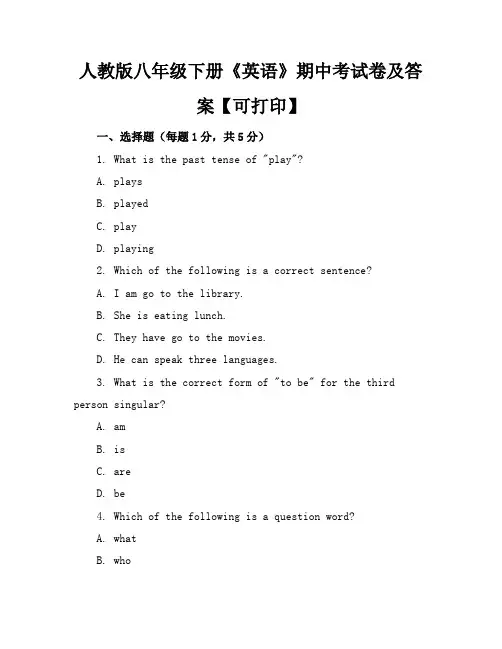
人教版八年级下册《英语》期中考试卷及答案【可打印】一、选择题(每题1分,共5分)1. What is the past tense of "play"?A. playsB. playedC. playD. playing2. Which of the following is a correct sentence?A. I am go to the library.B. She is eating lunch.C. They have go to the movies.D. He can speak three languages.3. What is the correct form of "to be" for the third person singular?A. amB. isC. areD. be4. Which of the following is a question word?A. whatB. whoC. whereD. all of the above5. What is the past tense of "do"?A. didB. doneC. doingD. do二、判断题(每题1分,共5分)1. The present continuous tense is used to talk about actions happening at the moment of speaking. ( )2. "Can" is used to ask for permission. ( )3. "There is" is used for singular nouns. ( )4. "How old are you?" is a question asking about someone's age. ( )5. "Could" is the past tense of "can". ( )三、填空题(每题1分,共5分)1. I ________ (watch) TV right now.2. ________ (he) name is John.3. ________ (they) are playing basketball.4. ________ (she) is my best friend.5. ________ (we) live in a big city.四、简答题(每题2分,共10分)1. What is the difference between "do" and "does"?2. How do you form the past tense of regular verbs?3. What are the question words used to ask about someone's age?4. Give an example of a possessive adjective.5. How do you form the present continuous tense?五、应用题(每题2分,共10分)1. Fill in the blanks with the correct form of the verb "to be".a. ________ (she) a teacher?b. ________ (they) students?c. ________ (we) happy?d. ________ (he) a doctor?2. Change the following sentences into questions.a. She is reading a book.b. They are playing football.c. I am going to the park.d. He is eating lunch.六、分析题(每题5分,共10分)1. Analyze the sentence "I am eating an apple." and identify the tense, subject, verb, and object.2. Compare and contrast the present simple tense and the present continuous tense. Provide examples for each.七、实践操作题(每题5分,共10分)1. Write a short dialogue between two friends talking about their hobbies.2. Write a paragraph about your favorite subject in school.八、专业设计题(每题2分,共10分)2. Create a flyer for a new afterschool club.3. Draw a map of your school campus, including all the important buildings and landmarks.4. Write a short story about a student who discovers a hidden talent.5. Design a game that can be played during recess.九、概念解释题(每题2分,共10分)1. Explain what a metaphor is and provide an example.2. Define the term "homophone" and give two examples.3. Describe what a simile is and provide an example.4. What is a "personification" and give an example.5. Explain the difference between "fact" and "opinion".十、思考题(每题2分,共10分)1. How can you use technology to improve your learning experience?2. What is the most important skill you have learned in school so far?3. How can you contribute to making your school a better place?4. What is your favorite subject and why?5. How do you handle stress and pressure at school?十一、社会扩展题(每题3分,共15分)1. Research a current event and write a short summary.3. Write a letter to your local government official about an issue that concerns you.4. Design a public service announcement about an important issue.一、选择题答案:1. B2. B3. B4. D5. A动词时态(过去时)句子结构(陈述句)动词时态(第三人称单数)疑问词动词时态(过去时)二、判断题答案:1. √2. √3. √4. √5. √现在进行时的用法"Can" 的用法"There is" 的用法疑问句的用法"Could" 的时态三、填空题答案:1. am watching2. His3. They4. She5. We现在进行时物主代词人称代词疑问句的构成四、简答题答案:1. "Do" 用于第一和第二人称,"Does" 用于第三人称单数。
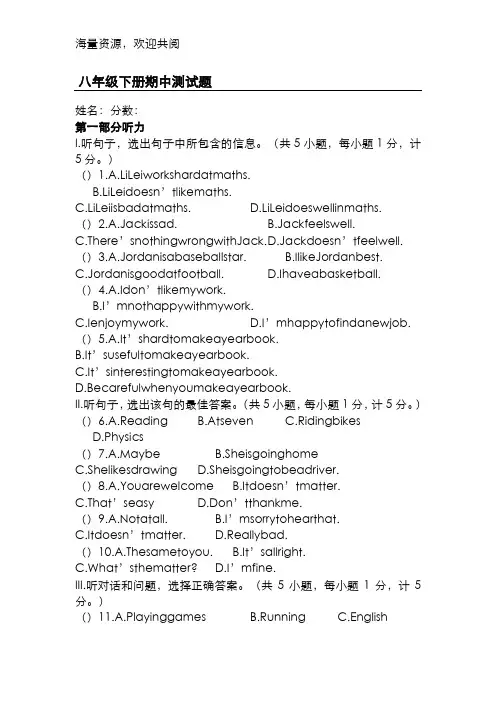
八年级下册期中测试题姓名:分数:第一部分听力I.听句子,选出句子中所包含的信息。
(共5小题,每小题1分,计5分。
)()1.A.LiLeiworkshardatmaths.B.LiLeidoesn’tlikemaths.()9.A.Notatall. B.I’msorrytohearthat.C.Itdoesn’tmatter.D.Reallybad.()10.A.Thesametoyou. B.It’sallright.C.What’sthematter?D.I’mfine.III.听对话和问题,选择正确答案。
(共5小题,每小题1分,计5分。
)()11.A.Playinggames B.Running C.EnglishD.Drawing()12.A.basketballplayer B.AgooddoctorC.AworkerD.Amoviestar()eEnglish B.ListentotheradioC.WatchTVD.Readbooks()14.A.Playing B.ReadingC.PlayingthepianoD.Drawing()15.A.Singing B.DrawingI1.Ifitsunnytomorrow,wefootballinthepark.A.is,playB.is,willplayC.willbe,willplayD.willbe,canhave2.WhileJimmytheCD,hisfathercamehome.A.waswatchingB.washearingC.waslisteningtoD.bough t3.Ithinktherelesscarsinthefuture.A.don’t,willhaveB.don’t,willbeC./,won’thaveD.do ,is4.Lilyisoverthere,sheistalkingtoafriendthephone.A.onB.inC.byD.for10.--Therearetwonewcarsinfrontofthebuilding.---OneisBill’s,____isthemanager’s.A.otherB.anotherC.othersD.theother.11.----Thereisnobodyhere.Let’splayfootball.----No,wecan’t.Myfatheroftentellsme_______inthestreet.It’sdangerous.A.toplayB.don’tplayC.nottoplayD.playing12.Mondaywillbe_________.________badweatheritis!A.rainy;WhatB.rainy;WhataC.sunny;HowD.sunny;Howa13.Itisimportant_______you_______outforawalkaftersupper.A.our;She;He;SheD.ours;He19.Ittookusabout______toflytoHongKongDisneyland.A.twoandhalfanhoursB.twoandahalfhoursC.twohoursandhalfD.twohourandahal20.--Let`ssurftheInternet--_____A.That`sallrightB.GoodideaC.GoodluckD.Thankyou II.完形填空(25分)AItwastheendoftheterm.Itwasthelast21ofschool.TheteacherThefather30toreadDavid.Nowyou33canhaveawonderfulholiday.34willyourhol idaylast(持续)?”“Itwilllasteightweeks,”t hechildrensaid.“Eightwee ks!Let’sgotoHawaii35vacation!”saidthefather.21.A.year B.day C.week D.month22.A.told B.talked C.said D.spoke 23.A.from B.with C.of D.in 24.A.ever B.never C.alwaysD.hardly25.A.gotto B.arriveat C.got D.wentD.Howlong35.A.on B.at C.to D.aboutBtenfasterthanacaranddon’thavetoworryaboutparking(停车).Youcan37itanywhere.Becauseithasa38atthebackandaba sketatthefront,Icantakemysmalldaughterwhenitiscoldanditiss nowinghard.Italsocanbe39.Youmustbe40onabike.Accidents arenottheonlyproblem.OnedayIwent41andwhenIcameback,thingstooquicklyandyoucan’tunderstandthem.Butifyoukeep yoursenseofhumor(幽默感),youcanalwayshaveagoodlaughatthemistakesyoumake(你所犯的错误).Don’tbeunhappyifpeopleseemtobelaughingatyourmistakes(错误).Itisbetterforpeopletolaughatyourmistakesthantobeangry withyou.becausetheydon’tunderstandwhatyouaresaying.Th emostimportantthingforle arningEnglishis:“Don’tbeafraidof makingmistakesbecauseeveryonemakesmistakes.”or()50.Thestorytellsus:”__________”.A.Onlyfoolish(愚蠢的)peoplemakemistakesB.FewpeoplemakemistakesC.PeoplenevermakemistakesD.Thereisnoonewhodoesn’tmakemistakesBAtaxihitatruck.Apolicemanspoketothetaxidriverandtothe truckdriver.HealsospoketoTom.Hewasawitness(目击者).Thisiswhattheysaid.sataxiabouttwohundredmetersbehindthetruck.Itwasgoingfas t.Whenthetrucksloweddown,thetaxihitit.Thetaxidriverwasnotlo okingatthetruck.Hewaslookingoutofthewindowatsomething. Myfriendsawtheaccident,too.Tom'sfriendspoketothepolicemanandagreedwithTom.( )51.Howmanypeoplearementioned(提到)inthestory?A.Three.B.Four.C.Five.D.Six.( )52.Thetruckwashitontheway___________.A.totheairportB.tothepolicestationC.toNewtonD.home57.“Don’tplayfootballhere."Thepolicetoldtheboy.”(转换成间接引语)Thepolicetoldtheboy________________playfootball_______. 58.Ifyoudon'thurryup,you'llfailtocatchtheearlytrain.Hurryup,______you'll______theearlytrain.59.ThestudentsinGradeOnehaveagoodtimeonChildren'sDay.ThestudentsinGradeOne____________onChildren'sDay.60.Thedeskistooheavyformetocarry.Thedeskis_______heavy_______Ican’tcarryit.V.写作69.Ihopemyfatherandmotherare_________________()70.MostAmericansrememberwhattheyweredoingwhentheWorldTradeCenterinNewYork_________(毁坏)byterrorist.第三节书面表达(满分15分)你将来可能会很富有,请你就以下这个题目用英语表达你一旦富有后,你将如何帮助他人。
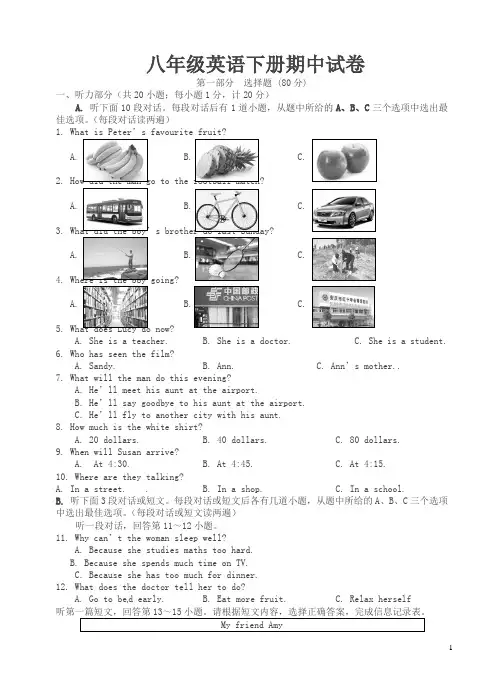
八年级英语下册期中试卷第一部分选择题 (80分)一、听力部分(共20小题;每小题1分,计20分)A. 听下面10段对话。
每段对话后有1道小题,从题中所给的A、B、C三个选项中选出最佳选项。
(每段对话读两遍)1. What is Peter’s favourite fruit?A. B. C.2. How did the man go to the football match?A. B. C.3. What did the boy’s brother do last Sunday?A. B. C.4. Where is the boy going?A. B. C.5. What does Lucy do now?A. She is a teacher.B. She is a doctor.C. She is a student.6. Who has seen the film?A. Sandy.B. Ann.C. Ann’s mother..7. What will the man do this evening?A. He’ll meet his aunt at the airport.B. He’ll say goodbye to his aunt at the airport.C. He’ll fly to another city with his aunt.8. How much is the white shirt?A. 20 dollars.B. 40 dollars.C. 80 dollars.9. When will Susan arrive?A. At 4:30.B. At 4:45.C. At 4:15.10. Where are they talking?A. In a street.B. In a shop.C. In a school.B. 听下面3段对话或短文。
每段对话或短文后各有几道小题,从题中所给的A、B、C三个选项中选出最佳选项。
2022年八年级(下)期中英语试卷(附答案与解析)一、选择填空(共10小题,每小题1分:计10分)1.(1分)﹣﹣You look worried. What's wrong?﹣﹣I want to join in after﹣school activity club.But I'm not sure which to choose.()A.the;a B./;an C.the;an2.(1分)Jack found difficult the river without taking a boat.()A.that,to go across B.it,to crossC.it,across3.(1分)He tried his best to study well get into his dream university.()A.so that B.in order toC.in order that4.(1分)I ask two students the way to the post office,but______ of them knew.()A.both B.neither C.none5.(1分)In the past,people used to__________news in the newspaper.Now more and more people are used to__________news on the Internet.()A.reading,looking troughB.read,to throughC.read,looking trough6.(1分)___it's not a big deal,you can forget about it and be friends again.()A.Unless B.Although C.Since7.(1分)he did,his parents always believed he was a kind boy.()A.While B.Whatever C.However8.(1分)What pleasant weather!______________go out for a walk?()A.Why not B.What if C.How about9.(1分)The teacher's words made a big difference the boy,because from then on,he thought what he did really had meaning his future.()A.to,to B.from,for C.from,to10.(1分)﹣﹣I argued with my parents just now.﹣﹣l think you say sorry to them. They are just worrying that you can't look after well.()A.can,themselves B.should,youC.could,yourself二、根据对话内容,从方框中选出适当的选项补全对话,并将选项的编号依次填入题号后的横线上。
2023—2024学年度第二学期第一次学情监测八年级英语试题(考试时间:120分钟满分:100分)第Ⅰ卷(选择题共45分)一. 听力选择(共15小题,计15分)(一)请听录音中八组短对话。
每组对话后有一个小题,从题中所给的A、B、C三个选项中,选出与对话内容相符的图片或能回答所给问题的最佳答案。
(每组对话读两遍)1. What is mum’s advice?A. B. C.2. What will Jenny do right now?A. B. C.3. What was Jack doing at nine o’clock last Sunday morning?A. B. C.4. Who will help at the food bank this Sunday?A. Eric.B. Mandy.C. Ms. Brown.5. What does the man advise the woman to do with Lucy?A. To give her a ticket to a movie.B. To say sorry to her.C. To give her a call.6. Why does the girl can’t move her neck?A. She played with the phone too much.B. She did too much homework.C. She watched TV for a whole day.7. Where was Mary during the heavy rain?A. At home.B. In the supermarket.C. In the library.8. What chore does Bob usually do?A. Do the dishes.B. Clean the kitchen.C. Make dinners.(二)请听录音中两段较长的对话。
八年级下期期中考试英语Ⅰ.单项选择每小题1分,共15分1.— What’s the matter your younger sister— She has a cough.B. atC. withD. onhad a , so she went to see the dentist.A. headacheB. stomachache D. fever3. She finished the novel and returned it to me in time.A. read read D. Reads4. — I forgot to take my wallet. Can you me some money— No problem. Here you are.A. lend5. Your bedroom is very dirty. Please at once.A. clean up it it up up them them up6. Mary is singing and dreams of being a singer.A. angry of in at7. — Have you heard that UFO landed on Center Street yesterday— Of course. And alien got out of the UFO and visited the TV station.;the ;an ;an ;an8. — I have too much housework to do at home.— ask your husband for helpcan don’t not about9. — What are you going to do if it tomorrow— I haven’t thought about it.’t rain ’t rain C. doesn’t rain ’t rainingteacher my mobile phone because I used it in class.out away off place11.— How long can I this book— For a week.12. The girl ice cream in the sofa while the boy paper at the table.eating;was cutting eating;cut ;was cutting ;cut13 — Every day we have to the uniform to school. What about you— So do we. I think it’s very good for the middle school students. on on14. — How are you getting on with your work— I can’t do it anymore. I need help.asked me to have a party.would I go will I go I would go I will goⅡ完型填空共15小题,每小题1分,满分15分阅读下面短文,从短文所给的四个选项中,选出可以填入空白处的最佳选项Children are sometimes 16__ on weekends than weekends 17_many after-school classes. Many of them are learning exam skills 18_ get into a good high school and later a good university. Others are practicing sports so that they can compete 19____ others and win. However, this doesn’t only happenin China.20_Taylors are a typical American family. Life of Cathy Taylor’s three children 21 very busy. “ On most days after school,” Cathy says, “ I take one of my two boys to basketball practice and my daughter to football training. Then I have to take 22 son to piano lessons. Maybe I could cut 23_a few of their activities, but I believe these are important for my children’s future. I really want them 24.” However, the tired children don’t get home until after 7:00 . They have a quick dinner, and then it’s time for homework.Linda Miller, a mother of three, knows all about 25_ stress. “In some families, competition starts very young and continues until the kids get older,”she says. “ Mothers send their small kids to all kinds of classes. And they are always 26_ them with other children. It’s crazy. I don’t think that is fair. Why not let their children be kids People should’t push their kids so hard.Doctor says 27_pressure is not good for a child’s 28_. Dr Alice Green says all these activities can cause lots of stress for children. “ Kids should have time to relax and think for 29__, too. 30__it’s normal to want successful kids, it’s even more important to have happy children for parents.”16. A. busy B. busily C. busiest D. busier17. A. because of C. so18. A. so that B. in order to C. in order that D. for19. A. to B. at C. with20. A. a D. The21. A. is B. are C. be D. was22. A. any other B. other C. the other D. others23. A. up B. out C. down D. off24. successful B. to successful C. to be successful D. to success25. A. so B. as C. for D. such26. A. comparing compare C. compared D. to compete27. A. too many B. too much C. much too D. a lot28. A. developed B. developing C. development D. develop29. A. them B. their C. others D. themselves30. A. Although B. but C. because D. soⅢ阅读理解共15小题,计30分阅读下列短文并做每篇后面的题目;从各题A、B、C、D中选出能正确回答所提问题或完成所给句子的最佳答案;AA man decided to take off动身 early from work and go drinking. He stayed there until the bar closed at three in the morning, and he was drunk喝醉酒的 at that time. After leaving the bar, he returned home on foot. When he entered his house, he didn't want to wake his wife, so he took off his shoes and started tiptoeing用脚尖走 up the stairs. Halfway up the stairs, he fell down. That wouldn't have been so bad, but he had some empty bottles in his back pockets, and they broke. The broken glass hurt his back terribly. He was so drunk that he didn't know he was hurt. A few minutes later, when he was taking off his clothes, he noticed the blood, so he looked himself over in the mirror. He found his back was hurt terribly. He repaired the damage受损的 as good as he could and then he went tobed. The next morning his head was hurting, his back was hurting, and he was trying to think up a good story when his wife came into the bedroom. He told his wife his story. “Well, you really tied one on last night,” she said, “and where did you go” “I worked late,” he said, “and I stopped for a cup of beer.” “A cup of beer That’s a joke,” she replied, “and you were drunk last night. Where did you go” “What makes you so sure I got drunk last night” “Well,” she replied, “my first big clue线索 was when I got up this morning, I found many Band-Aids创可贴on the mirror.”man didn't want to wake his wife because .A. he loved his wife very muchB. he was afraid that he would be hurtC. he was afraid his wife would find him drunkD. his wife liked him doing sodid the wife find her husband got drunkA. She was very clever.B. She found many Band-Aids on the mirror.C. She found some broken bottles.D. She knew her husband very well.underlined phrase “tied one on” may mean “”.A. 摔倒B. 躺在地上C. 受伤D. 喝醉34..When did the man find himself hurtA. When he took off his clothes to go to bed.B. When he fell down to the ground.C. At three o’c lock in the morning.D. When his head and back were hurting.BThe Graham family of Kansas did something very unusual last year. Mr and Mrs Graham did not go to work, and their children did not go to school. Instead, Craig and Marlene Graham and their children, Courtney, 12, and Collier, 4, traveled together in a van箱式车 and drove across America for a whole year.First, Craig and Marlene sold their business生意. Craig had a fruit business, and Marlene owned a small newspaper. Then they sold their large house. Finally, Courtney said goodbye to her classmates, and their dream trip began. The Graham family started their trip on July 4. They visited big cities and small towns in all 50 states. They also visited the birthplaces of all the United States’Presidents总统. They wanted to visit many interesting places, parks, and zoos in the United States, but they also wanted to meet the American people. The Grahams had many wonderful experiences. Many people were very friendly and helpful to them. Some people invited the Graham family to stay in their homes with them.Every day, Marlene wrote reports about her family’s trip. She described the family’s daily experiences, where they went, and what they did. Courtney kept a journal of her life on the way. Marlene and Courtney put their writing on the Internet. Schoolchildren from all over the United States followed the Graham family’s trip by using computers at home and in school. Some children wrote letters to the Graham family. American newspapers carried stories about the Grahams, and people met the family on TV shows.At the end of the year, Craig said that they all had a wonderful trip. Courtney said that she missed her friends at school, but also enjoyed the trip very much. The Grahams traveled 54,944 miles. They returned home on the same date that they left: July 4. They plan to write a book about their travels to describe everything they learned about their country and the American people.35 To make their travel possible, the Grahams ___________.A. borrowed some money from their friendsB. sold their business and large houseC. received lots of money from the TV stationsD. made money by writing reports to newspapers36. Which of the following is NOT trueA. The Grahams visited all the places in the US.B. The Grahams visited all theC. The Grahams went to all the fifty states of their country.D. The Grahams met many friendly people during their travel.37. American people could learn something about the Grahams’ trip with thehelp of _________.A. newspapersB. TVC. the InternetD. all of the above第二部分非选择题共40分CⅣ任务型阅读Today it is found that most middle school students pay little attention to ’s because they have no interest in may not be the fact.②因为来自父母和老师的压力,他们不得不更加努力学习. Asforthestudentsthemselves,theywanttogetgoodresultssothattheycangofurtherfor theirstudies.③Theydon’thavetoputalltheireffortintostudyingandgiveupallthesportsandhobb i es.Infact,educationcannotgowithoutphysicalexercise,becauseaquickmindhardlygo esalongaweakbody.Allthestudentsshouldremember:Ifyoudon’thaveastrongbody,youcanneverachievean ything,38、在①句的空白处填入适当的词使句意完整,上下文通顺;________ _________39、将②句译成英文;_______________________________________________________________40、将③句译成中文_____________________________________________________________________ 41、找出文中或写出最能表达该短文主题的句子;___________________________________________________________DZhang Zhaojie, a 13-year-old schoolboy in Xiamen enjoyed many snacks during Spring Festival. “I love chocolate and chips very much. They are high in sugar and fat. But I can’t help eating them,” Zhang said.Recently, an online list of favorite snacks in China became popular. It said that peanuts, walnuts and chocolate are good for our health, and jelly, potato chips and lollipops棒棒糖are “bad”. Almost every kid on the planet loves snacks, and they seldom care how healthy they are. Although some snacks like chocolate and candy are found everywhere, others are unique独特的 to a country or a culture.In Japan, Matcha抹茶is a kind of green tea powder. It’s made from tea leaves and can be used with ice cream or cakes. In fact, Matcha originated in China but took off in Japan. Biscuits or cookies covered with chocolate are also a Japanese favorite.Potato chips and French fries are very popular in the US. They are cheap but tasty. But they are high in calories and eating too much may make you fat. Popcornis another typical snack. People eat it when they are watching sports games or visiting the amusement park. Most cinemas also sell Popcorn.In the UK, many people sit down for snacks at around 4 . every day. They callit “afternoon tea”. Traditional after noon tea is biscuits and tea. People alsohave scones烤饼 with jam and cream, which is probably the most classic EnglishⅤ句子改错5分46Luckily, thereisseriousnothingwith myeyes.ABClove sports , I like playing computer games ,either.A B Crained hardly, he could hardly go out any more.A B Cweeks are not a long time for me.A B Cis used to run in the morning, but now he is used to running in the afternoon.A B CⅥ.用所给词的适当形式填空10分you please cleanyour room right nowsure you can finish the work youmade a decideto help the homeless childrenoften see some understandthe teacher’s questionsare trying their best studyEnglish wellare all surprised to his sudden dieis difficult answerthis questionactivities are good for children’s developparents often make me sweepthe flooryou mind openthe windowsⅦ.根据对话内容,用合适的句子补全对话;10分A: Good morning, Doctor.B: Good morning, my boy_____61_______ 1A: I’ve got a headache and a cough. I’m sure there’s something wrong with me.B: _____62____A: I’m feeling even worse now.B: ________63____. Oh, it’s a bit high. I’m afraid you’ve got a cold. How long have you been like thisA: Even since last night. Is it serious, doctorB: No. Nothing serious.. ___64A: No, I didn’t feel like eating anything this morning. What should I do, doctorB: Well, don’t worry about it. Take the medicine three times a day. Stay in bed to have a good rest and drink more water. You’ll get well soon.A: ___65______, doctor. Goodbye.B: That’s all right. Goodbye.Ⅷ.根据汉语意思完成句子每小题2分,共10分66.我妈妈昨天晚上得了重感冒;My mother last night.67.我现在习惯住在农村了;Now I’m in the countryside.68.老师要我把这些试卷分发给学生们;The teacher asked me papers to students.69. 我进来的时候,他们正在谈论天气;They the weather when I came in.70. 他太累了,很快就睡着了;He was tired that he soon.Ⅸ.短文填空每小题1分,共10分It was a fine day in autumn. Some girls and boys were out with their teacher.They 71 to a museum. On their way to cross a bridge, they suddenly突然地 heard a loud shout behind them. The teacher told her pupils72 . Then she turned and listened. When she heard the cry“Mad dog”sheknew what was happening. 73she could do anything, she saw a dog running to them.“ 74 ”said the teacher,“keep close to each other. Don’t move or cry.”Then she stood before the childrenso that the dog would meet her first. The animal came 75At this moment the teacher saw a man. He ran up with a gun枪 in his 76 .“The children must be kept safe 77 the man comes.”Thought the lady. Theteacher ran to the dog, 78 it bravely. The mad dog snapped猛咬 at her andshe fell down. The man came and killed the animal. The dog had bitten her so 79 That the brave lady died soon after the doctors arrived. She lost her life forher 80 . When people heard of this, they said,“The brave lady will alwaysbe remembered among us”Ⅹ.书面表达共15分假设你是菲菲,最近一直不开心,你正在向你的姑姑倾诉你的烦恼:1.我在学校有很多好朋友,我们彼此相得都很好;2.每天我们一起打球,有时候看电影;3.但是有一天,我的一个朋友丢了一百块钱;他认为是我拿了他的钱,而且他还把这件事告诉了其他朋友;4.我很伤心,不知道该怎么办;我需要你的帮助,你能给我建议吗要求:180词左右;2条理清晰,语句连贯;Dear aunt,答题卷38 stop sports39. Because of too much pressure from parents and teachers, they have to workharder.40. 他们不必把所有的精力都放在学习上,而放弃所有的运动和业余爱好;41. Ifyoudon’thaveastrongbody,youcanneverachieveanything.42 chocolate 43. Pop corns 44 tea 45. Jam and creamⅤ句子改错5分46. B nothing serious 47 C too 48A hard49. B is 50 A used toⅥ.用所给词的适当形式填空10分51. clean 52. yourself 53. decision 54. to understand 55.to study56. death 57. to answer 58. development 59. sweep 60. openingⅦ.根据对话内容,用合适的句子补全对话;10分61.What’ the trouble with you / What’s the matter with you / What’s wrongwith you62.How are you feeling now me take your temperature.64. Did you eat anything for breakfast this morning you very muchⅧ.根据汉语意思完成句子每小题2分,共10分66. had a bad cold 67. used to living68. to give out 69. were talking about 70. so fell asleepⅨ.短文填空每小题1分,共10分71. were going 72. to stop 73. before 74. children 75. quickly76. hand 77. until 78. facing 79. badly 80. pupils。
八年级第二学期期中考试(英语)(考试总分:150 分)一、听力(本题共计1小题,总分20分)1.(20分)第一节听句子,选出与句子内容相关的图画。
(共5小题;每小题1分,满分5分)第二节听句子,选出与所听句子内容相符的正确答语。
(共5小题;每小题1分,满分5分) ( )6. A. I have a cold. B. I like reading English. C. I’m at school.( )7. A. Because it’s difficult. B. Because I like helping others. C. Because I missed the bus.( )8. A. I don’t have any time. B. I must go now. C. I’m going to sweep the floor.( )9. A. That’s too bad. I am very upset. B. You should go to a doctor. C. You should spend more time watching TV.( )10. A. Two girls. B. In a bank. C. In the morning.第三节听对话,选出能回答问题的正确选项。
(共5小题;每小题1分,满分5分)听第1段对话,回答第11,12题。
( )11. What is Jeff doing? A.Cleaning the house. B.Washing the car. C. Playing computer games.( )12. Who is Dave? A. Jeff’s brother. B. Jeff’s friend. C. Jeff’s cousin.听第2段对话,回答第13至15题。
( )13. Where is Molly going? A. The hospital. B. The school. C. The bank. ( )14. When will Molly get there? A. At 8 o’clock. B. At 9 o’clock. C. At 10 o’clock. ( )15. What is David going to do? A.Cheer up the kids. B. Give out food. C. Raise money.第四节听短文,完成下列信息表格。
英语A 卷(共100分)第一部分 听力测试(共 30 小题,计 30 分)一、听句子,根据所听到的内容选择正确答语。
每小题念两遍。
(共5小题,每小题1分,计5分)1. A. OK!B. I’m fine.C. I have a cold.2. A. I’m sorry.B. Have a good time.C. That’s a good idea.3. A. It was heavy.B. So was I.C. In the afternoon.4. A. Yes, sure.B. No, thank you.C. I see.5. A. Don’t worry. B. No problem. C. I agree.二、听句子,选择与所听句子内容相符的图片,每小题念两遍。
(共5小题,每小题1分,计5分)A. B. C. D. E.6. ________7. ________8. ________9. ________ 10. ________三、听对话,根据对话内容及问题选择正确答案。
每小题念两遍。
(共10小题,每小题1分,计10分)11. A. Grace. B. Mary. C. Bob.12. A. Cleaning his room. B. Meeting his friends C. Washing the clothes.13. A. At 7:30. B. At 7:40. C. At 7:45.14. A. In the morning. B. In the afternoon. C. In the evening.15. A. To the history museum. B. To the animal hospital. C. To the old people’s home.16 A. At home. B. At the school. C. At the hospital.17. A. Teacher and parent. B. Brother and sister. C. Classmates.18. A. On Wednesday. B. On Thursday. C. On Friday.19. A. To walk the dog. B. To set the table C. To cook dinner.20. A. Surprised. B. Angry. C. Excited.四、听短文,根据短文内容选择正确答案,短文念两遍。
第二学期期中测试卷初二英语一、听力测试 (20分)第一部分听对话回答问题(计10分,每小题1分)本部分共有10道小题,每小题你将听到一段对话,每段对话听两遍。
在听每段对话前,你将有5秒钟的时间阅读题目;听完每段对话后,你将有j秒钟的时间选出你认为最合适的答案。
请在听到“嘀”的信号时,进入下一小题。
( )1. What is the girl going to do on Saturday?( )2. Which sign are they talking about?( )3. Which has the woman never taken?( )4. Where did Linda go for the summer holidays?A. B. C.( )5. Why can't they take a vacation this month?A. Because they are too busy.B. Because they don't have much money.C. Because they don't like travelling.( )6. How many times has Mary been to Shanghai?A. Twice.B. Three times.C. Four times.( )7. How does the girl listen to music?A. On CDs.B. On the radio.C. On the Internet.( )8. What does the post office look like?A. It is a big building.B. It is a green building.C. It is a red building.( )9. Why can't the woman travel abroad?A. Because she is too busy.B. Because she has no money.C. Because her son is ill.( )10. Where does the man want to go?A. East Park.B. East Market.C. West Park.第二部分听对话和短文回答问题(计10分,每小题1分)你将听到一段对话和两篇短文,各听两遍。
八年级4月份质量检测英语试题卷第Ⅰ卷第一部分听力(共两节满分30分)第一节(共5小题,每小题2分,满分10分)听下面5段对话,每段对话后有一个小题,从题中所给的A、B、C三个选项中选出最佳选项,并标在试题的相应位置。
听完每段对话后,你都有10秒钟的时间来回答和阅读下一小题。
每段对话仅读一遍。
1. How many people in the world are right-handed?A. About 10%B. About 15%C. About 90%2. What's Linda doing now?A. Eating an appleB. Doing the houseworkC. Watching TV3. What is Mom's advice?A. Call Tom for the book.B. Ask their teacher to talk with TomC. Argue with Tom.4. Where was the girl while John and Mike were fighting?A. In the library.B. In the classroom.C. At home.5. What will the boy do after finishing his homework?A. Play football.B. Play computer games.C. Play basketball.第二节(共10小题,每小题2分,满分20分)听下面三段对话或独白,每段对话或独白后有几个小题,从题中所给的A、B、C三个选项中选出最佳选项,并标在试题的相应位置。
听每段对话前,你有时间阅读各小题,每小题5秒钟,听完后,各小题给出5秒钟的作答时间。
每段对话或独白读两遍。
听下面一段对话,回答第6至8三个小题。
6. What's the matter with Betty?A. She's feeling sick.B. She can't find her bike.C. She can't find her brother.7. Who took the bike away?A. JohnB. DavidC. The police8. Which is TRUE about the conversation?A. David went to Betty's house on foot.B. John is going to school by bike.C. Betty will call up the police next.听下面一段对话,回答第9至第11三个小题。
9. What was the weather like when Lily was going home?A. It was raining.B. It was snowing.C. It was windy.10. What's wrong with Lily?A. She hurt her arms.B. She hurt her hands.C. She hurt her legs.11. What will David help Lily to do?A. To study her lessons.B. To look after her.C. To make dinner.听下面一段独白,回答第12至第15四个小题。
12. What does the speaker think of doing voluntary work?A. It can make our life colorful.B. It can make us live a healthylife.C. It can help us be more experienced.13. What should you do first if you want to do voluntary work?A. Think about why we want to do it.B. Decide what voluntary work we would like to do most.C. Decide when to do it.14. What's the most important step in finding voluntary work?A. To know what kind of work we want to do.B. To know how much money we will get from the work.C. To know what we can learn from the work.15. How many tips does the speaker give us?A. Two.B. Three.C. Four.第二部分阅读理解(共两节满分40分)第一节(共15小题,每小题2分,共30分)阅读下列短文,从每题所给的A、B、C、D四个选项中选出最佳选项。
AOnce when I was a teenager, my father and I were standing in line to buy tickets for the circus. Finally, there was only one family between the ticket office and us. This family made a big impression on me.There were eight children, all probably under the age of 12. You could tell they didn’t have a lot of money.Their clothes were not expensive, but they were clean. The children talked excitedly about the clowns. It was clearly a very important day out for them. The father and mother seemed happy as they could be.The tickets lady asked how many tickets the father wanted, he proudly answered, “Please let me buy ei ght children’s tickets and two adults’ tickets, so I can take my family to the circus.”The ticket lady told him the price.The man’s wife lowered her head. There was no longer a smile on the man’s face. He quietly asked, “How much did you say?”The ticket lady again told him the price.The man obviously didn’t have enough money. But how could he tell his kids the bad news?Seeing what was happening, my dad took a $20 note from his pocket and dropped in on the ground. He then tapped the man on the shoulder and said, “Excuse me, sir, you dropped this.”The man understood my father was helping him. He picked up the money, looked straight into my dad’s eyes, and in tears replied. “Thank you. This really meansa lot to me and my family.”16. Why does the writer say “Their clothes were not expensive, but they were clean” ?A. To show the children were well looked after.B. To show cheap clothes could be popular.C. To show how hard the mother worked.D. To show how rich the family were.17. Why was the poor man unhappy after he spoke with the ticket lady?A. He had lost his money.B. His children were noisy.C. The tickets were sold out.D. The tickets were too expensive18. Who did the $20 note belong to?A. The poor man .B. The writer’s father.C. The poor man’s wife.D. The ticket lady.19. Why was the poor man in tears at the end of the story?A. He found the money he lost.B. He wanted others to help him.C. He made his children unhappy.D. He was thankful for the kindness.20. Which of the following statements is probably true according to the passage?A. The poor man saw the circus that night.B. The two families became close friends.C. The writer’s father earned some money.D. The writer saw the circs that night.BOnce upon a time, a man punished his 5-year-old daughter for using up the family' s expensive gold wrapping (包装 ) paper. Money was always not enough, and he became even more upset when on Christmas Eve, he saw that the child had p asted ( 贴) the gold paper to decorate a shoebox to put under the Christmas tree.The next morning the little girl, filled with excitement, brought the gift box to her father and said, "This is for you, Daddy!"As he opened the box, the father was sorry for his earlier behavior.But after he opened it, he found it was empty and again he was angry. "Don't you know, young lady," he said, "when you give someone a present there's supposed to be something inside the package!"The little girl looked up at him with tears running from her eyes and said, "Daddy, it's not empty. I blew kisses into it until it was all full."When the father heard this, he fell on his knees and put his arm around his dear little girl. He begged her to forgive him for his unnecessary anger.An accident took the life of the child only a short time later. It is told that the father kept that little gold box by his bed for all the year of his life. Whenever he was sad or faced difficult problems he would open the box, take out an imaginary kiss, and remember the love of this beautiful child who had put it there.In a very real sense, each of us as human beings have been given an invisible golden box filled with love and kisses from our children, family, friends and God. This is the most expensive possession (财产) anyone could hold.21. Why did the man punish his little daughter?A. Because his daughter made some mistakes.B. Because his daughter asked he for Christmas present.C. Because his daughter used up their only gold wrapping paper.D. Because his daughter decorated the Christmas tree with gold wrapping paper.22. Why was the man sorry for his behavior as he opened the box?A. Because his daughter bought him a Christmas gift.B. Because he misunderstood his daughter for wasting paper.C. Because he saw his daughter was so excited.D. Because the box was covered with the kisses.23. What's the meaning of the underlined word "invisible"?A. 贵重的B. 无形的C. 珍爱的D. 唯一的24. What did the man do when he had problem in his life after his daughter died?A. He missed his daughter so much.B. He took out the box and kissed it.C. He thought of his daughter's love.D. He put the box by his bed.25. What's the best title for the passage?A. The KissB. The GiftC. The FatherD. The DaughterC“Tom? Are you in bed yet?” called Mrs. White. There was no answer. Mrs. White put down her book and went to her 14-year-old son’s room. Tom was sitting in front of a bright computer screen on which a motorbike was running fast.“Oh, Tom. You’re still playing on that comput er game. You must stop now, because it’s half past eleven. If you don’t go to bed soon, you’ll be very tired tomorrow.” Said Mrs. White.“But I’ve nearly won the game.” Tom said to Mrs. White. She could see the excitement on his face. She sat beside him.“You’re always playing on the computer. You spend more time on this machine t han on your homework.”Today more and more families have computers. Parents hope computers can help their children improve their study at school. But many of their children use computers to play games, listen to songs and watch videos instead of studying. We often see that computer net bars are crowded with people, especially young boys. They spend a lot of money competing with the computerized machines. The more they lose, the mo re they want to win. The result is that they don’t want to work or study.In some countries, even scientists hate computers. They say computers cause millions of people to lose their jobs or cause them a lot of trouble. Computer game addiction(瘾) is a serious problem in social life. Something should have to be done to solve the problem.26. How did Mrs. White feel when she saw her son playing late?A. She felt happy.B. She felt worried.C. She felt wonderful.D. She felt excited.27. Parents hope computers can __________________.A. help their children improve their study at school.B. help their children play well.C. help their children know a lot of Internet knowledge.D. help their children relax themselves.28. Many children use computers to _____________.A. watch videosB. listen to songsC. play gamesD. A、B and C29. The writer thinks __________________.A. the boys can go to the computer net bars, but the girls can’t.B. the computer net bars are very usefulC. the children spend too much money on computer gamesD. the children should play computer games.30. Why do some scientists hate computers?A. They think computers cause millions of people to lose their jobs.B. They think computers cause them a lot of trouble.C. They think it’s a waste of time to use computers.D. Both A and B.第二节(共5小题,每题2分,满分10分)五位母亲Betty, Sara, Gina, Mary和 Alice打算为各自的孩子选择一所合适的学校。